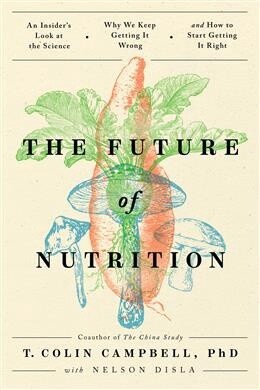The Future of Nutrition by T. Colin Campbell
2020 Foreword Indie Award Winner in the “Health” Category
From the coauthor of The China Study and author of the New York Times bestselling follow-up, Whole
Despite extensive research and overwhelming public information on nutrition and health science, we are more confused than ever—about the foods we eat, what good nutrition looks like, and what it can do for our health.
In The Future of Nutrition, T. Colin Campbell cuts through the noise with an in-depth analysis of our historical relationship to the food we eat, the source of our present information overload, and what our current path means for the future—both for individual health and society as a whole.
In these pages, Campbell takes on the institution of nutrition itself, unpacking:
• Why the institutional emphasis on individual nutrients (instead of whole foods) as a means to explain nutrition has had catastrophic consequences
• How our reverence for “high quality” animal protein has distorted our understanding of cholesterol, saturated fat, unsaturated fat, environmental carcinogens, and more
• Why mainstream food and nutrient recommendations and public policy favor corporate interests over that of personal and planetary health
• How we can ensure that public nutrition literacy can prevent and treat personal illness more effectively and economically
The Future of Nutrition offers a fascinating deep-dive behind the curtain of the field of nutrition—with implications both for our health and for the practice of science itself.
For more than 40 years, T. Colin Campbell, PhD, has been at the forefront of nutrition research. His legacy, the China Study, is the most comprehensive study of health and nutrition ever conducted. Dr. Campbell is the Jacob Gould Schurman Professor Emeritus of Nutritional Biochemistry at Cornell University. He has received more than 70 grant years of peer-reviewed research funding and authored more than 300 research papers. The China Study was the culmination of a 20-year partnership of Cornell University, Oxford University and the Chinese Academy of Preventive Medicine.
Nelson Disla is a writer and editor. He graduated from the University of North Carolina at Chapel Hill, where he studied English. He has worked for non-profit organizations, small businesses, and local government.
Author Residence: Ithaca, NY and Carrboro, NC
